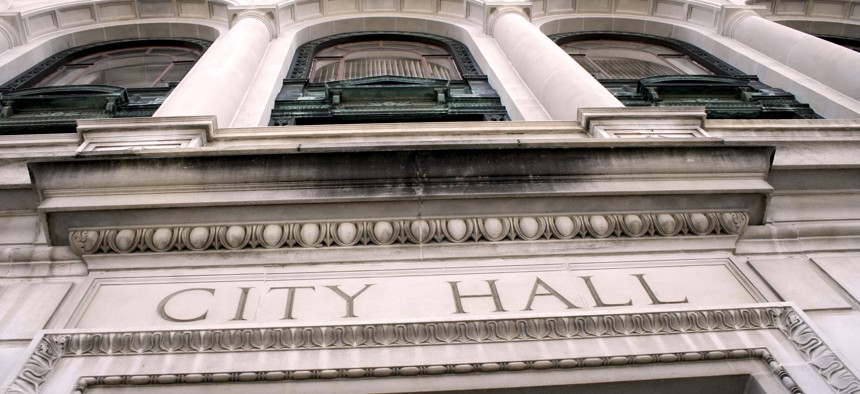Half of Cities Expect to Cut Public Services Due to Pandemic

The city hall building in Saint Joseph, Missouri, on April 1, 2020. Shutterstock / Lee Powell

Connecting state and local government leaders
As local leaders urge more funding for cities, Congress is locked in a stalemate over funding priorities.
The federal government is beginning to distribute money to states this week as part of the coronavirus economic aid package, but local leaders are emphasizing that they will still be forced to make drastic budget cuts this year as the pandemic dries up multiple sources of revenue.
Eighty-eight percent of local leaders surveyed by the United States Conference of Mayors and the National League of Cities said they expect a budget shortfall this year due to the impact of the coronavirus pandemic on the economy. It’s why city and county officials are pushing congressional lawmakers to include more direct funding for local government in the next economic stimulus plan.
“These numbers reveal the enormous economic challenges that cities, large and small, are facing and the consequences for city workers and the critical services they provide,” said USCM President Bryan Barnett, the mayor of Rochester Hills, Michigan. “Cities will have to make painful decisions that will affect real people’s lives and the safety and well-being of their communities if Congress does not help.”
With large segments of the economy shut down to stop the spread of the coronavirus, local government revenues have sharply declined. As a result, about 52% of local government leaders said they expect their cities will have to cut public services and 27% expect to lay off employees. The findings, released Tuesday, are based on a survey of public officials from more than 2,400 cities, towns and villages that was conducted from April 1 to 7.
Revenue declines and budget cuts will be acutely felt in cities with populations between 50,000 and 500,000, the survey predicts.
The $2 trillion Coronavirus Aid, Relief, and Economic Security (CARES) Act allots $150 million for direct aid to state and local governments, tribal governments and territories. But only cities with populations over 500,000 are eligible for that funding, meaning just 36 cities can directly access the economic aid. Some have emphasized that smaller cities and counties could get help from states or, in the case of certain municipalities, from large counties eligible for direct assistance. But mayors have also questioned whether these “pass throughs” will really happen.
“How can this bill be the bill that helps America respond and recover when cities in 27 of our 50 states are not going to receive any direct relief funding?” said Kathy Maness, the NLC’s first vice president and a Lexington, South Carolina council member.
South Carolina is among the states in which not a single city will receive direct aid through the CARES Act, Maness said.
For smaller cities, which have budgets reeling from the pandemic, budget shortfalls could lead to major cuts and reduction of services, officials said. In Rochester Hills, which has a population of about 75,000, Barnett said one-third of the city’s budget is in flux as a result of the pandemic crisis.
“This is not a big city problem, it is an every city problem,” Barnett said.
As local leaders focus on the need for more federal funding, it’s unclear whether they will be able to convince the Trump administration to dole out more direct aid. Democrats and Republicans in Congress are locked in a stalemate over their next move to help the U.S. economy.
Republicans have sought to increase the amount of money available to small businesses through the Paycheck Protection Program, which is providing $350 billion in loans and grants for businesses with fewer than 500 employees.
Senate Majority Leader Mitch McConnell had sought to add another $250 billion to the program, but was blocked by Democrats who said the program needs to be tailored to provide relief to some small businesses that have been left out of the loop.
Treasury Secretary Steven Mnuchin said Monday that $230 billion in PPP loans has already been distributed and that Congress should focus on replenishing funding for the program. After a “top off” of that program, Mnuchin suggested lawmakers can come back to the drawing board on a fourth relief bill that could include more funding for other priorities.
House Speaker Nancy Pelosi and Senate Minority Leader Chuck Schumer put out a joint statement this week agreeing that the “oversubscribed” program should receive more funding. But they said changes are necessary because “many eligible small businesses continue to be excluded from the Paycheck Protection Program by big banks with significant lending capacity.”
The Democratic leaders also made clear that they believe more money should be made available for hospitals, safety net programs like food stamps, more aid to local governments, and efforts to improve coronavirus testing capacity.

NEXT STORY: Furor Erupts: Billions Going To Hospitals Based On Medicare Billings, Not COVID-19




